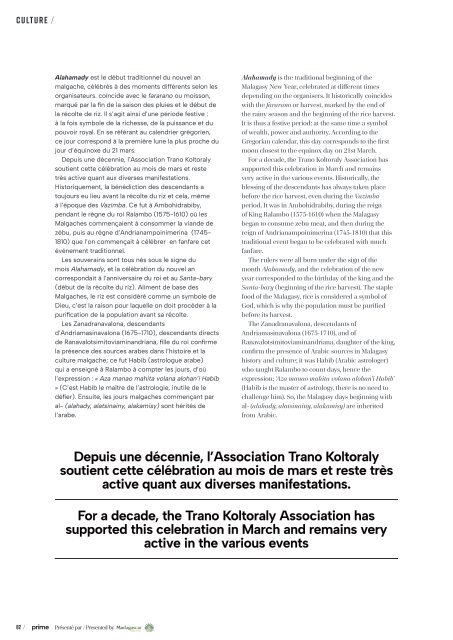Prime Magazine Mars / March 2023
Create successful ePaper yourself
Turn your PDF publications into a flip-book with our unique Google optimized e-Paper software.
culture /<br />
Alahamady est le début traditionnel du nouvel an<br />
malgache, célébrés à des moments différents selon les<br />
organisateurs. coïncide avec le fararano ou moisson,<br />
marqué par la fin de la saison des pluies et le début de<br />
la récolte de riz. Il s’agit ainsi d’une période festive :<br />
à la fois symbole de la richesse, de la puissance et du<br />
pouvoir royal. En se référant au calendrier grégorien,<br />
ce jour correspond à la première lune la plus proche du<br />
jour d’équinoxe du 21 mars.<br />
Depuis une décennie, l’Association Trano Koltoraly<br />
soutient cette célébration au mois de mars et reste<br />
très active quant aux diverses manifestations.<br />
Historiquement, la bénédiction des descendants a<br />
toujours eu lieu avant la récolte du riz et cela, même<br />
à l’époque des Vazimba. Ce fut à Ambohidrabiby,<br />
pendant le règne du roi Ralambo (1575-1610) où les<br />
Malgaches commençaient à consommer la viande de<br />
zébu, puis au règne d’Andrianampoinimerina (1745-<br />
1810) que l’on commençait à célébrer en fanfare cet<br />
événement traditionnel.<br />
Les souverains sont tous nés sous le signe du<br />
mois Alahamady, et la célébration du nouvel an<br />
correspondait à l’anniversaire du roi et au Santa-bary<br />
(début de la récolte du riz). Aliment de base des<br />
Malgaches, le riz est considéré comme un symbole de<br />
Dieu, c’est la raison pour laquelle on doit procéder à la<br />
purification de la population avant sa récolte.<br />
Les Zanadranavalona, descendants<br />
d’Andriamasinavalona (1675-1710), descendants directs<br />
de Ranavalotsimitoviaminandriana, fille du roi confirme<br />
la présence des sources arabes dans l’histoire et la<br />
culture malgache; ce fut Habib (astrologue arabe)<br />
qui a enseigné à Ralambo à compter les jours, d’où<br />
l’expression : « Aza manao mahita volana alohan’i Habib<br />
» (C’est Habib le maître de l’astrologie, inutile de le<br />
défier). Ensuite, les jours malgaches commençant par<br />
al- (alahady, alatsinainy, alakamisy) sont hérités de<br />
l’arabe.<br />
Alahamady is the traditional beginning of the<br />
Malagasy New Year, celebrated at different times<br />
depending on the organisers. It historically coincides<br />
with the fararano or harvest, marked by the end of<br />
the rainy season and the beginning of the rice harvest.<br />
It is thus a festive period: at the same time a symbol<br />
of wealth, power and authority. According to the<br />
Gregorian calendar, this day corresponds to the first<br />
moon closest to the equinox day on 21st <strong>March</strong>.<br />
For a decade, the Trano Koltoraly Association has<br />
supported this celebration in <strong>March</strong> and remains<br />
very active in the various events. Historically, the<br />
blessing of the descendants has always taken place<br />
before the rice harvest, even during the Vazimba<br />
period. It was in Ambohidrabiby, during the reign<br />
of King Ralambo (1575-1610) when the Malagasy<br />
began to consume zebu meat, and then during the<br />
reign of Andrianampoinimerina (1745-1810) that this<br />
traditional event began to be celebrated with much<br />
fanfare.<br />
The rulers were all born under the sign of the<br />
month Alahamady, and the celebration of the new<br />
year corresponded to the birthday of the king and the<br />
Santa-bary (beginning of the rice harvest). The staple<br />
food of the Malagasy, rice is considered a symbol of<br />
God, which is why the population must be purified<br />
before its harvest.<br />
The Zanadranavalona, descendants of<br />
Andriamasinavalona (1675-1710), and of<br />
Ranavalotsimitoviaminandriana, daughter of the king,<br />
confirm the presence of Arabic sources in Malagasy<br />
history and culture; it was Habib (Arabic astrologer)<br />
who taught Ralambo to count days, hence the<br />
expression: ‘Aza manao mahita volana alohan'i Habib’<br />
(Habib is the master of astrology, there is no need to<br />
challenge him). So, the Malagasy days beginning with<br />
al- (alahady, alatsinainy, alakamisy) are inherited<br />
from Arabic.<br />
Depuis une décennie, l’Association Trano Koltoraly<br />
soutient cette célébration au mois de mars et reste très<br />
active quant aux diverses manifestations.<br />
For a decade, the Trano Koltoraly Association has<br />
supported this celebration in <strong>March</strong> and remains very<br />
active in the various events<br />
82 / prime Présenté par / Presented by
















